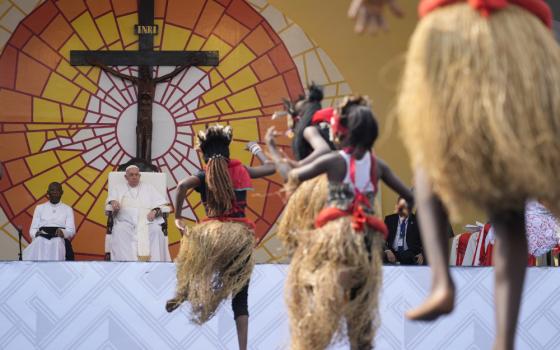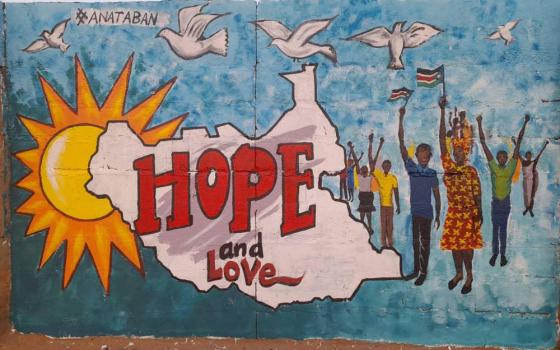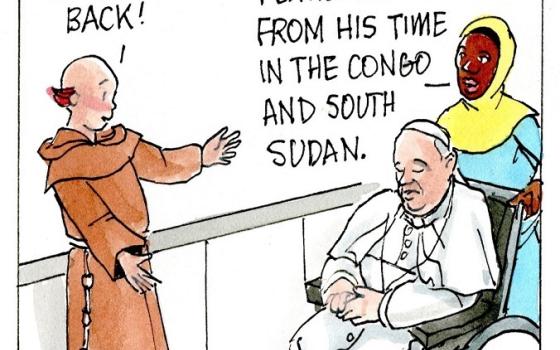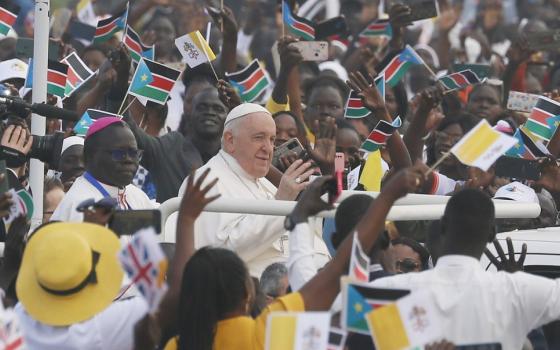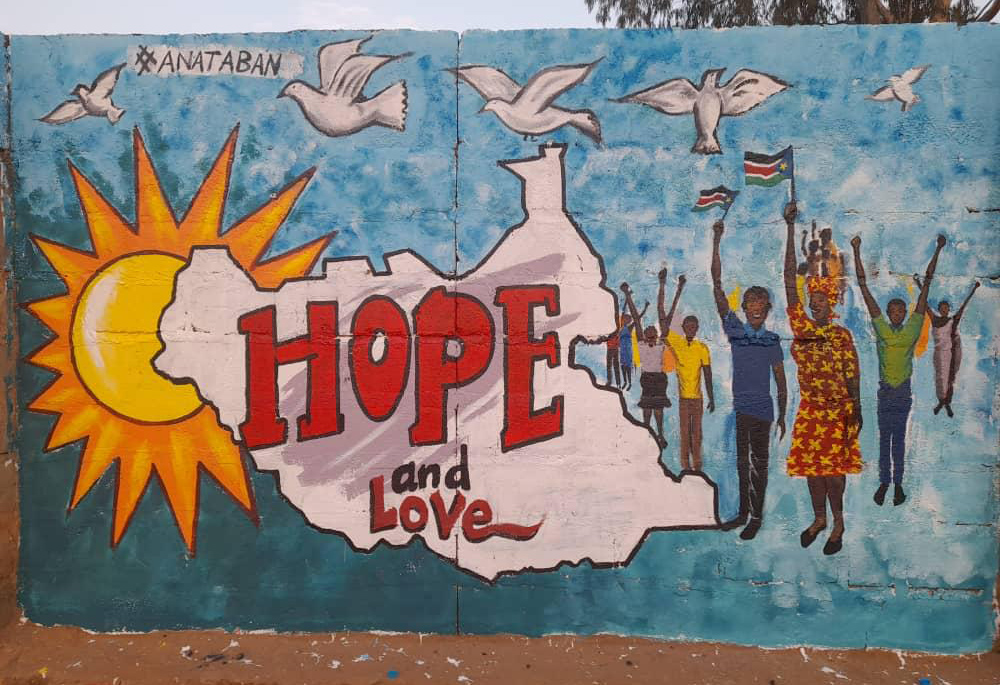
A mural welcomes Pope Francis and other church leaders coming to South Sudan for a historic ecumenical visit. The mural was created during the Jan. 28 and Jan. 31 Youth Peace Pilgrimages, held in the capital of Juba. (Courtesy of Sant'Egidio/Elizabeth Boyle)
When civil war erupted in the world's newest country in 2013, South Sudanese political rivals held hostage the country's future by ensuring that all efforts at peace began and ended at their command.
Today, the two men — President Salva Kiir, 71, and Riek Machar, 70 — lead a fragile coalition government, one that Pope Francis, the archbishop of Canterbury and the moderator of the Church of Scotland appealed to during their historic Feb. 3-5 ecumenical visit, begging for a renewed commitment to unity in the young nation.
But the three church leaders also had a different audience in mind, recognizing that the desperate grip of power held by the country's leading septuagenarians won't last forever.
"Although conflict, violence and hatred have replaced good memories on the first pages of the life of this republic, you must be the ones to rewrite its history as a history of peace!" said Francis at a Feb. 4 meeting of internally displaced persons.
"May you, young people of different ethnicities, write the first pages of this new chapter," the pope pleaded.
Yet even prior to the arrival of the church leaders to South Sudan, a group of young people representing a range of Christian churches were taking matters into their own hands in an effort to build a new alliance among the next generation of leaders to outlive the short three-day visit.
"The visit of the three religious leaders inspired the youth," said Simon Gore Augustino, 43, the youth coordinator for the Catholic Archdiocese of Juba, in an interview with NCR.
"They asked themselves, if Pope Francis, the archbishop and the moderator are able to come together for the first time in the history of the church to South Sudan to bring the peace, why can't the young people come together within the same country with the message of peace to start doing something great for young people?" he said.
On the eve of the visit, on both Jan. 28 and Jan. 31, two ecumenical rallies, known as the Youth Peace Pilgrimages, were held in the capital of Juba, bringing out an estimated 500 people between the ages of 15-35 for a time of joint prayer, music and art collaboration. And on Feb. 3, when the leaders of the three churches arrived, the young people came together in one gathering to line the streets of Juba to welcome the three churchmen.
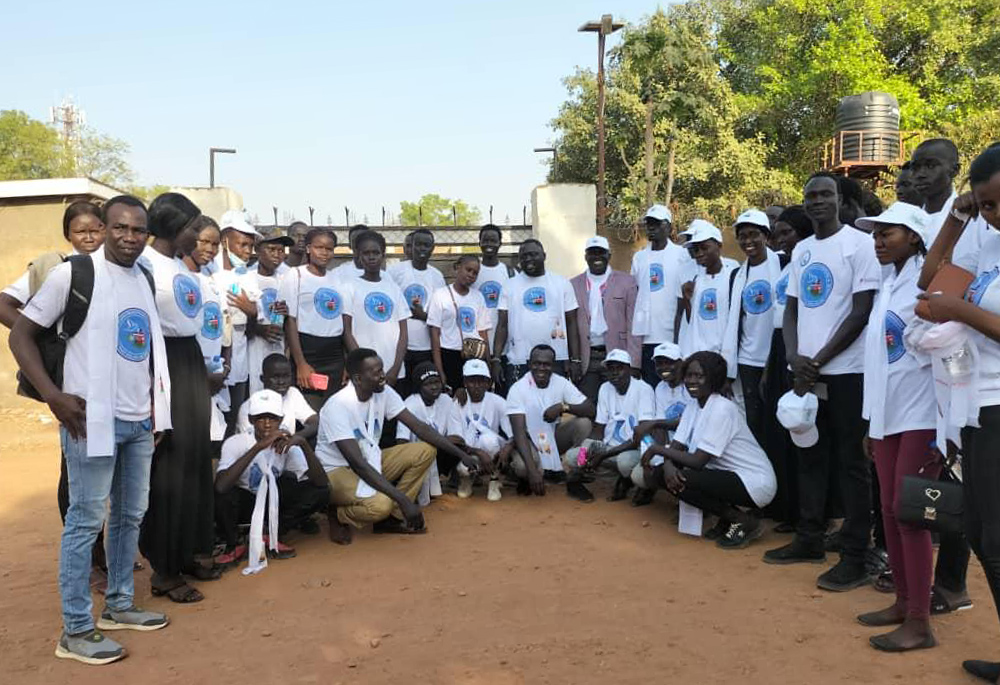
Members of the Youth Peace Pilgrimages await Pope Francis' arrival in South Sudan on Feb. 3. (Courtesy of Sant'Egidio/Elizabeth Boyle)
"We wanted to create a platform by the youth, to the youth, for the youth," said James Sekwat, a founder of a collective of young, multiethnic South Sudanese artists and activists known as Antaban, which co-sponsored the peace pilgrimages.
Together the young people from a mix of Christian traditions taught one another new music in different languages, planted trees as a sign of peace, and painted banners and murals to welcome the religious leaders to town.
"Young people are suffering economically, politically and socially," said Sekwat, whose group uses art and music to advocate for a peaceful South Sudan free from tribalism and violence.
The two pilgrimages, according to Sekwat, were a chance to provide an exchange between young people from different church backgrounds, many of whom he said are unaware that other Christian denominations exist, as well as a geographical exchange, giving lived expression to what Francis has called a "culture of encounter."
"Most young people don't have access to travel," he said, noting that the pilgrimage was a chance to bring young people from east Juba to west Juba, and vice versa, providing many of them with the opportunity to leave the confines of their own neighborhoods for the first time.
More than 73% of South Sudan's population of roughly 11 million is under age 30, yet since the country gained independence in 2011, its ruling class has made little room for them to participate in building the country's future.
"Politicians use youth for their own gains," lamented Sekwat, describing how the country's politicians task young people to serve as their bodyguards or drivers, but never provide them a seat at the table of power.
The Youth Peace Pilgrimages, he believes, will help change that.
Advertisement
Organized jointly by Antaban, the South Sudan Council of Churches and the Community of Sant'Egidio, a Catholic social service organization based in Rome that has helped facilitate the peace process though its ongoing work in the country, the gatherings of young people were originally planned as a way to bring young people together in the lead-up to the visit to cross-pollinate among different Christian affiliations, ethnic groups and neighborhoods.
But following the success of the two gatherings, organizers want to take the show on the road, moving beyond Juba and into the country's other nine states.
"I see the network bridging the gap created through tribalism and civil war among young people," said 23-year-old Martha Adut Kuol, the youth coordinator for the Episcopal Church of South Sudan.
"We want to create stories of patriotism and not tribalism or nepotism," she told NCR. "Young people are capable of reaching out to every state in the country and changing things."
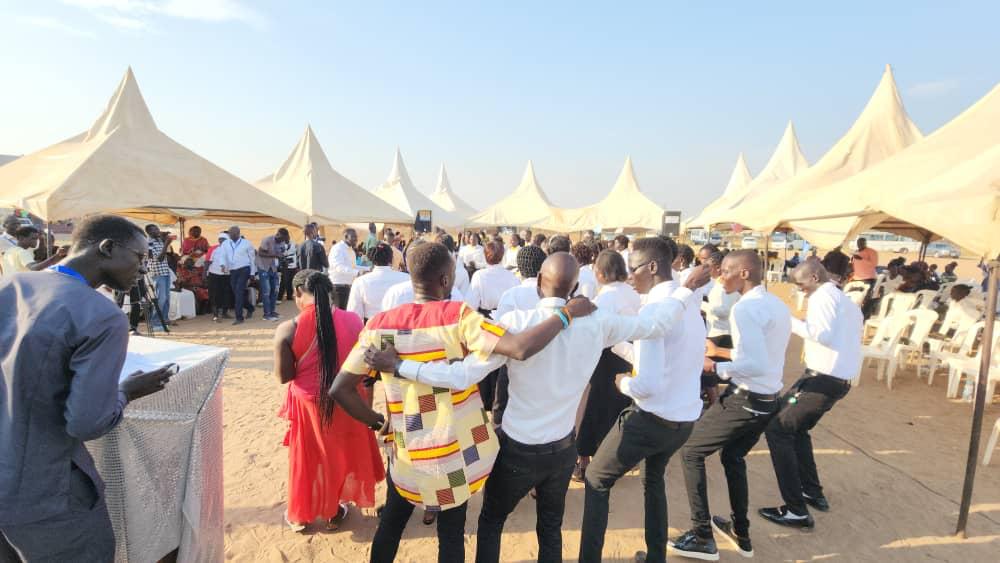
Participants celebrate in a photo from the Jan. 28 and Jan. 31 Youth Peace Pilgrimages in Juba, South Sudan. (Courtesy of Sant'Egidio/Elizabeth Boyle)
According to Sekwat, it's easier for young people to be given a gun than it is to be given a concrete opportunity to participate in the country's political or economic life.
Guns, he said, are readily given away to help defend cattle farms or someone's property. The Youth Peace Pilgrimages, he said, will provide young people with "different tools" to help them cultivate a new future for themselves or the country.
"Give young people a fishing net so they can fish for themselves or teach them to make cheese from the cattle," he said. "This starts from the bottom up. Now we need to reach a wider audience."
Sharoon Lugor, 25, who is the African Inland Church of South Sudan's youth leader of evangelism, said that he envisions gatherings throughout the majority-Christian country to bring together young people "without discrimination and no division to walk together as one church."
Lugor, who is also secretary of the Youth Peace Pilgrimages, said that the organizers plan to appeal directly to President Kiir as "the father of the land" for a meeting where they can present this vision. Going forward, the group needs financial support to expand the project and mentors who can work with youth from around the country.
"This cannot end in the capital city," he said.
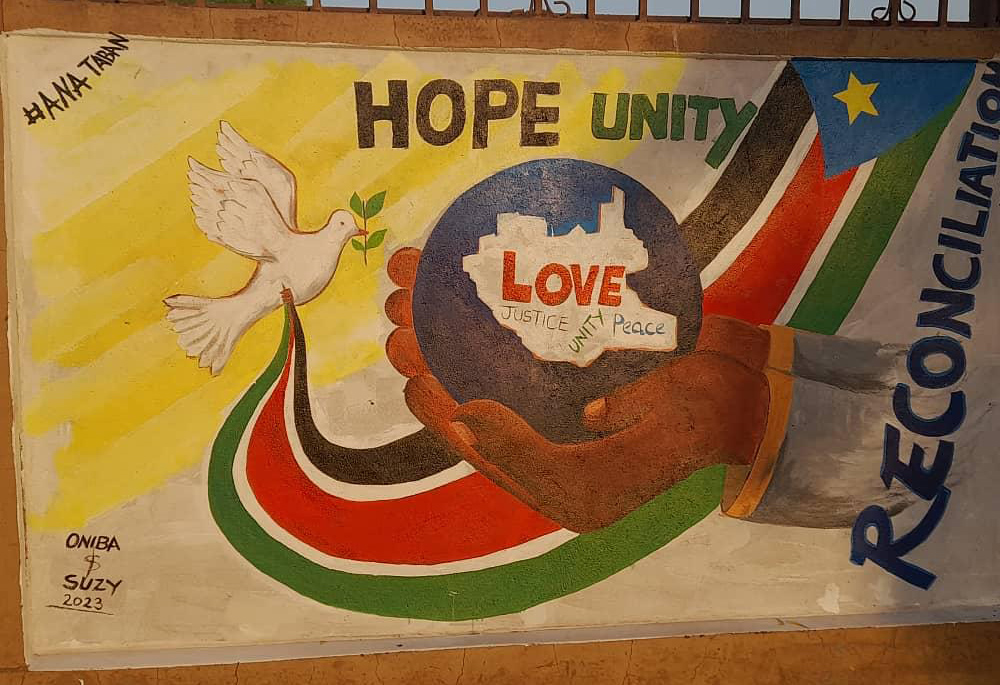
A mural to welcome ecumenical leaders, created during the Jan. 28 and Jan. 31 Youth Peace Pilgrimages (Courtesy of Sant'Egidio/Elizabeth Boyle)
At the gatherings in Juba, Lugor recalled witnessing young people from three different tribes, putting aside their differences and coming together to paint a mural to welcome the religious leaders.
"That is unity," he told NCR. "That is the peace we are talking about."
Similarly, Kuol recalled watching young people who had never met joining together in song and teaching each other the lyrics in a new language.
"It was the first time in the history of the church in South Sudan that young people from different denominations and tribes came together to raise up one voice as one people," she said.
"It was beautiful, I could see the joy in them," remembered Kuol. "I wish this could always continue."





